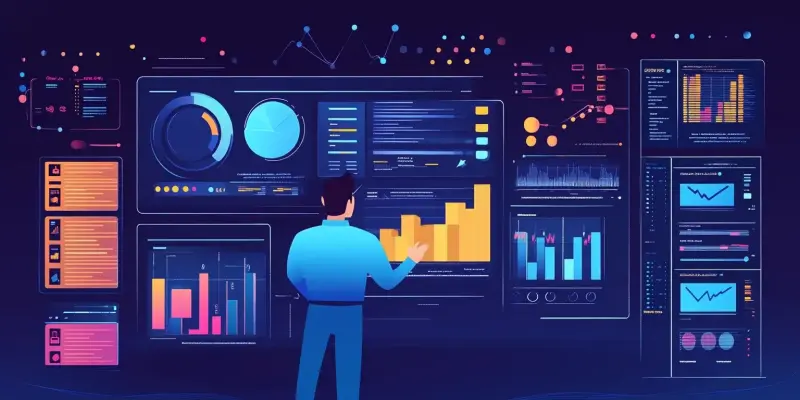In today’s digital age, the sheer volume of data generated daily is staggering. Traditional data management methods are no longer sufficient to handle this influx, leading enterprises to adopt advanced data engineering solutions. These solutions are crucial for building, maintaining, and managing data-driven infrastructures that transform unstructured data into valuable insights. This transformation is essential for making informed business decisions and gaining a competitive edge in the market.
Data engineering has found itself at the heart of modern enterprises. With organizations generating and collecting vast amounts of data, efficient data management systems have become indispensable. Data engineering frameworks, coupled with modern technologies such as cloud-based platforms, streamline data workflows and bolster data accessibility and governance. These robust solutions pave the way for implementing big data analytics, machine learning, and artificial intelligence, ultimately driving innovation and operational efficiency like never before.
The Importance of Data Engineering
The rise of data lakes and lakehouses exemplifies the adaptable nature of data engineering solutions. These sophisticated systems are designed to handle both structured and unstructured data, thereby providing businesses with deeper and more actionable insights. As data creation continues to grow at an unprecedented rate, the need for advanced data engineering solutions cannot be overstated. Enterprises must be equipped to handle increasing data volumes, turning potential challenges into opportunities for growth and innovation.
Data engineering’s significance is further underscored by its crucial role in the analytical processes that drive key business insights. From predictive analytics that forecast future trends to prescriptive analytics that recommend optimal actions, data engineering frameworks provide the necessary foundation. By ensuring that reliable, high-quality data is available, these systems empower organizations to make decisions rooted in evidence rather than speculation. As enterprises continue to digitize their operations and embrace data-driven strategies, the prominence of data engineering will only continue to rise.
Challenges in Data Engineering
Despite the clear advantages, data engineering comes with its own set of challenges. Integrating data from diverse sources such as databases, APIs, and data lakes is one of the primary obstacles. These sources often have compatibility issues, necessitating complex transformation processes to ensure seamless data aggregation. The challenge of ensuring data quality cannot be underestimated either. Accurate, consistent, and reliable data demands extensive validation efforts and advanced cleaning techniques to eliminate noise and inaccuracies, ensuring that insights drawn from the data are trustworthy.
Another significant challenge in data engineering revolves around scalability. As data volumes continue to grow exponentially, designing systems that scale efficiently without suffering from performance degradation presents a complex architectural hurdle. Real-time processing adds another layer of complexity. Modern enterprises require systems capable of streaming and processing data in real-time with low latency to achieve continuous operational improvements and maintain their competitive edge. Addressing these challenges is critical for enabling robust and effective data engineering practices within organizations.
Security and Compliance
Adhering to regulatory standards such as GDPR or HIPAA introduces another set of challenges for data engineering. Organizations are required to implement robust security measures to protect sensitive data, adding complexity to data pipeline architectures. Ensuring compliance with these regulations while maintaining operational efficiency is a delicate balance that businesses must navigate. Beyond compliance, the sheer volume and sensitivity of the data necessitate stringent security protocols to protect against breaches and unauthorized access.
The selection of appropriate tools and technologies adds to the complexity of data engineering. With a myriad of available options, data engineers must stay abreast of industry trends and choose suitable solutions for specific use cases. This requires continuous learning and adaptability, as the landscape of data engineering tools and technologies is constantly evolving. Effective collaboration between data scientists, analysts, and IT engineers is vital to align goals and methodologies across departments. Such collaboration ensures that data engineering efforts are in harmony with the organization’s overall objectives, driving cohesive and efficient data management strategies.
Best Practices in Data Engineering
To address the myriad challenges in data engineering, adopting best practices is essential. Emphasizing data integrity and accuracy forms the cornerstone of a robust data engineering strategy. Establishing clear guidelines for data access, security, and compliance helps maintain data quality and reliability. Comprehensive validation checks, along with stringent cleansing processes and continuous error monitoring, are vital for ensuring the consistency and reliability of data. These measures help in minimizing discrepancies and ensuring that data-driven decisions are based on accurate information.
Automation tools play a pivotal role in enhancing data management efficiency and reducing human errors. By automating repetitive and mundane tasks, these tools free up valuable resources, allowing data engineers to focus on more complex and strategic aspects of data management. Adopting cloud-based solutions further aids in scaling processes according to dynamic business needs. The agility of cloud platforms ensures that organizations can efficiently manage fluctuating data volumes without compromising on performance. Staying updated with the latest trends in data engineering, such as real-time analytics, machine learning integration, and data mesh concepts, is also crucial for maintaining a competitive edge.
The Future of Data Engineering
In today’s digital era, the volume of data generated every day is overwhelming. Traditional data management techniques are now outdated, making it necessary for businesses to turn to advanced data engineering solutions. These innovative methods are vital for creating and maintaining data-driven infrastructures that convert unstructured data into actionable insights. This conversion is key to making informed business decisions and staying competitive in the marketplace.
Data engineering has become the backbone of modern companies. As businesses produce and gather enormous amounts of data, efficient data management systems are crucial. Data engineering frameworks, in conjunction with modern technologies like cloud platforms, simplify data workflows and enhance data accessibility and governance. These comprehensive solutions enable the integration of big data analytics, machine learning, and artificial intelligence, driving unprecedented innovation and operational efficiency. This synergy between advanced data engineering and technology is essential for businesses striving to excel in a data-centric world.

